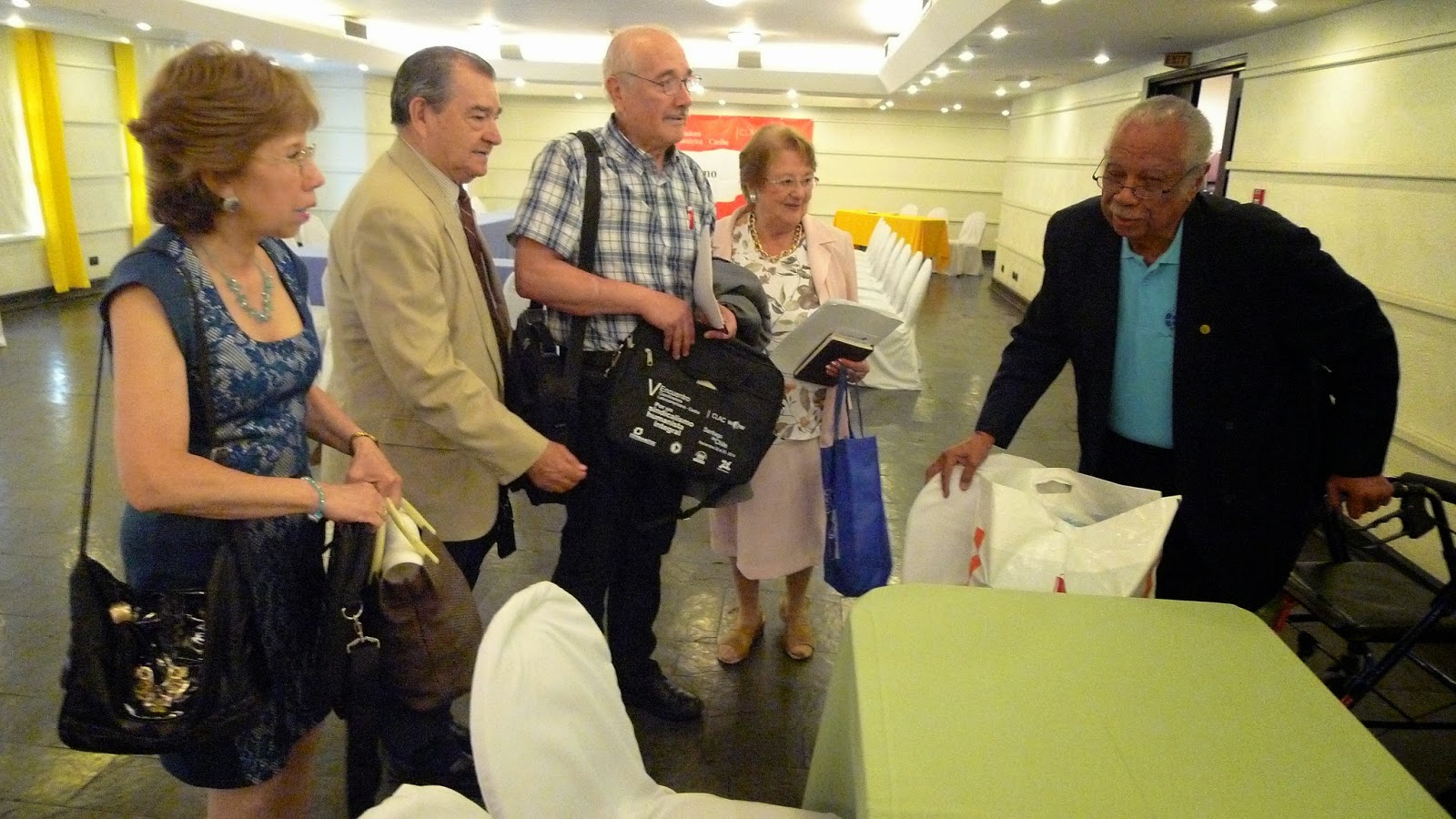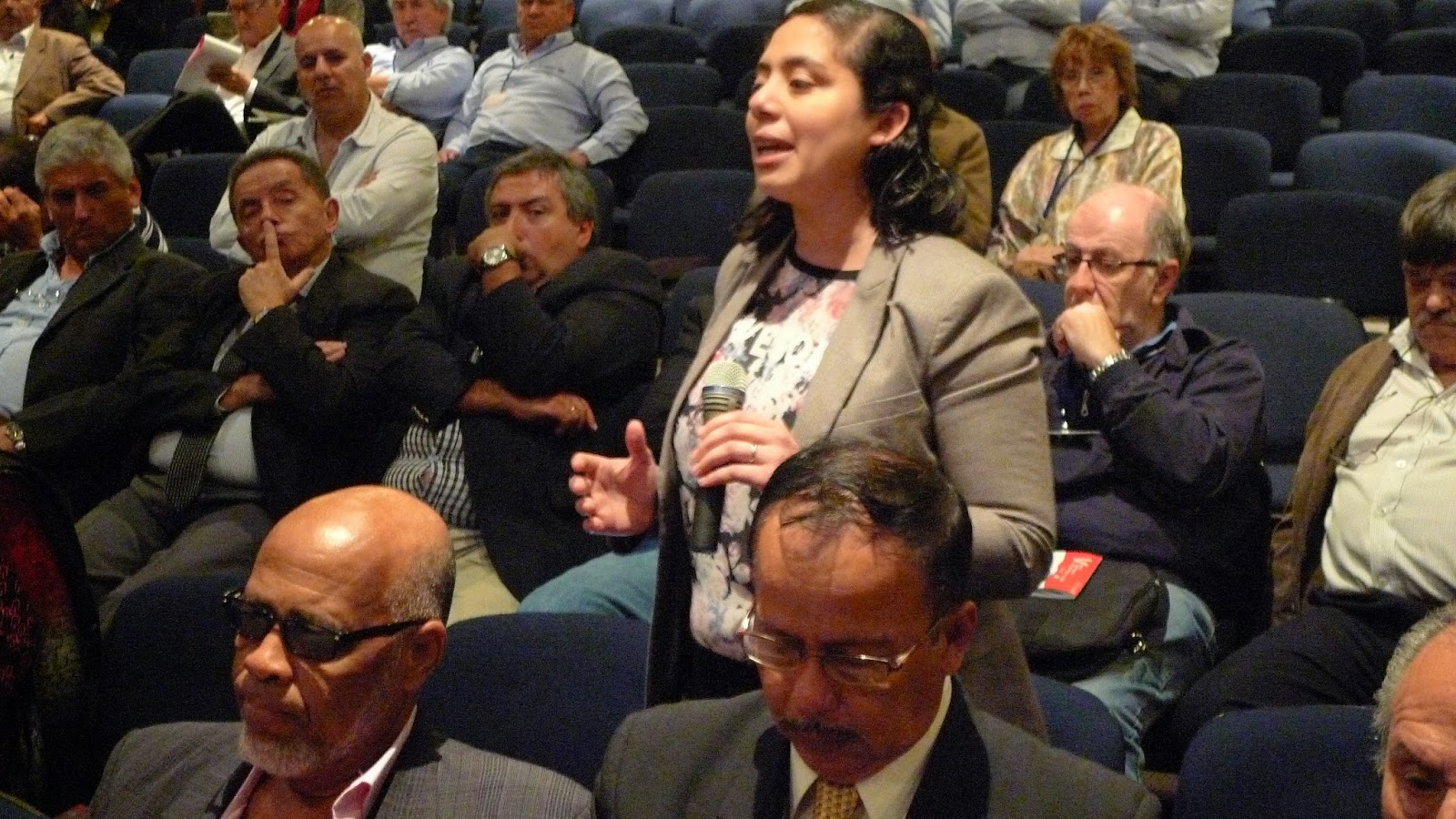 |
| Eduardo Garcia Moure (centre) and Julio Robert Gomez (left on the photo) were two of the protagonists of the merger of CLAT with ORIT into the CSA. |
In May 2000
it was announced that CLAT General Secretary Emilio Maspero was
deceased as a result of cancer (see my previous blog). Unfortunately,
the outside world was never informed. I have no idea why this has not
happened. Perhaps dying by cancer is still a taboo in Latin America.
Maybe Maspero himself and the CLAT Board Members, which I assume they
were aware, were afraid of political consequences and conflicts over
his succession.
Maspero was
succeeded as General Secretary of CLAT by the Cuban exile Eduardo
Garcia, for decades a member of the Executive Committee of CLAT. It
was no secret that Enrique Marius, Deputy General Secretary of CLAT
for international relations, was disappointed at this turn of events.
He would have loved to be the successor to Maspero. But Eduardo
Garcia was much better known and more popular in Latin America than
Marius. As director of ILACDE, the Institute of CLAT for
international cooperation, his position was not easy. Incidentally he had to criticize member
organizations of CLAT because of shortcomings in the presentation and
implementation of projects.
Enrique
Marius, Eduardo Garcia and Rodolfo Romero (Paraguay) were the only
ones of the newly elected board CLAT who lived and worked in Caracas.
The other Deputy General Secretaries of CLAT - Felicito Avila
(Honduras), Julio Roberto Gomez (Colombia), Mario Morant (Argentina)
and Anselmo Pontilius (Aruba) - continued to work and live in
their own country. The new CLAT Board continued the policy of
Maspero. Unfortunately was lost on this occasion the opportunity to
make some innovations in the Board and the CLAT policy. It would have
been good for CLAT, if a woman had become member of the board, as
well as a representative of the trade union action. It might have led
to a shift of less (party) politics unto more practical trade union
work.
In the
autumn of 2000, the WCL Confederal Board met in Washington. WCL had
managed to invite two keynote speakers for this meeting: the Managing Director of the IMF, Michel Camdessus (France) and ILO Director
General Juan Somavia (Chile). It proved that the WCL as a minority
organization, was able to conduct a social dialogue at the highest
level about social and economic policies for the benefit of workers
worldwide.
Especially
the Belgium trade union confederation ACV/CSC did important work in
this area because of their good relations with the governor of the
Belgian National Bank and the presidency of the Human Rights Workers
Group at the ILO. With financial support from the Belgian government
several international meetings were held in Wahington during which
WCL leaders from different continents had meetings with IMF experts
and World Bank staff. At these meetings, the trade unions could
express their criticisms and demands on the role of the World Bank
and IMF in the international debt crisis, its reform policy and its
consequences for developing countries.
For this
Confederal Board I had planned to raise the question about the
organization of the secretariat, by not presenting the usual report
on European activities. Of course, it is not customary to do so but
there was no other way left. The secretary General did not want to
take measures to strengthen the European secretariat. It was a
personal form of protest against the state of affairs at the
secretariat. Due to lack of resources and vision, all the work in de
past in Central and Eastern Europe threatened to have been for
nothing. That in itself was reason enough to pull the bell but there
was more. By neglecting the European base of the WCL, the survival of
the WCL became itself at risk.
 |
| IMF Managing Director Michel Camdessus speaking at the WCL Conferral Board meeting in Washington (2000) |
My protest
was not successful. That the continents stayed silent, I could
understand from their point of view that Europe is for the Europeans.
On the other hand, I expected that high level WCL leaders would have
the insight that a weak European base eventually had to have an
impact on the survival of the WCL. The European unions were, after
all, by far the largest financiers of the WCL, on the first place the
Belgian trade union confederation ACV/CSC followed by the Dutch trade
union confederation CNV.
That the
ACV/CSC trade union confederation did not react and thus supported
their General Secretary was logical and understandable. But that no
European organization reacted, not even “my own CNV”, I found
very disappointing. I had hoped that my action would have resulted in
at least a debate, a debate that had come to a dead end at the
secretariat. Also I did not succeed to develop a common WCL policy
vision on European affairs, while on the European agenda there were
new ambitious European projects like the introduction of a common
currency, that is to say the Euro, that in one or another way would
affect all European Union workers. Apparently such policy was the
exclusive domain of the ETUC (and I believe, in consultation with the
ICFTU).
My position
was already not easy. It had started earlier with an overt accusation
of the General Secretary on a European coordination meeting that I
had organized without budgetary coverage, projects and missions in
Central and Eastern Europe. I was shocked that this was not discussed
beforehand because then he would have been aware of the falsity of
his claim. However, during this meeting ACV / CSC policy officer
Paul Buekenhout openly recognized that spendings were indeed
justified in view of the financial commitments of the ACV / CSC trade
union confederation itself. Later, the Secretary General attempted to
dismiss me. Thanks to the CNV trade union confederation those actions
had no results. Obviously the situation between General Secretary
Willy Thys and myself had become increasingly difficult.



















